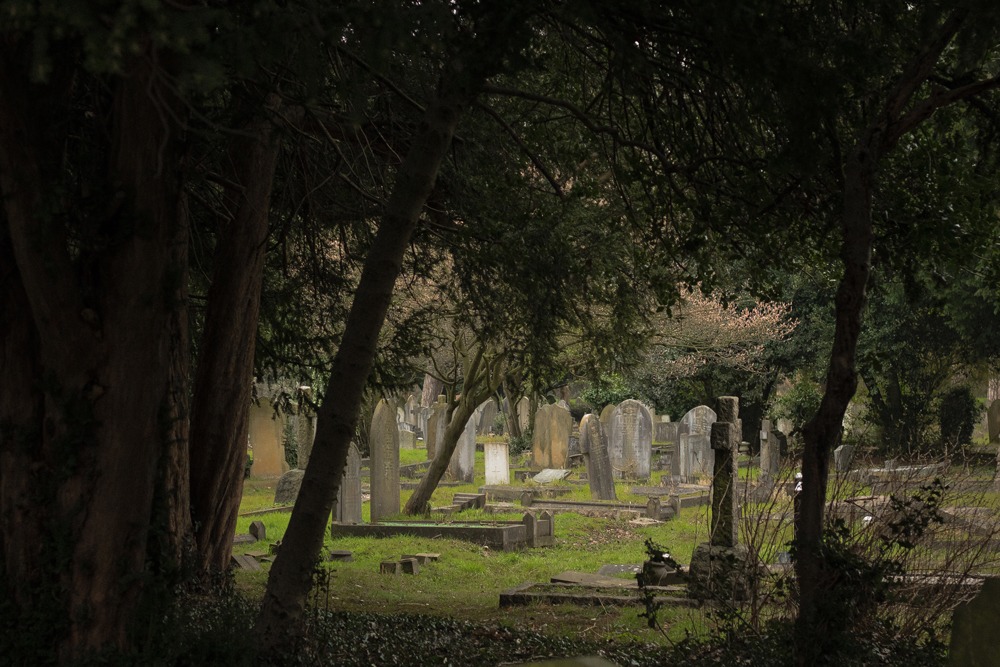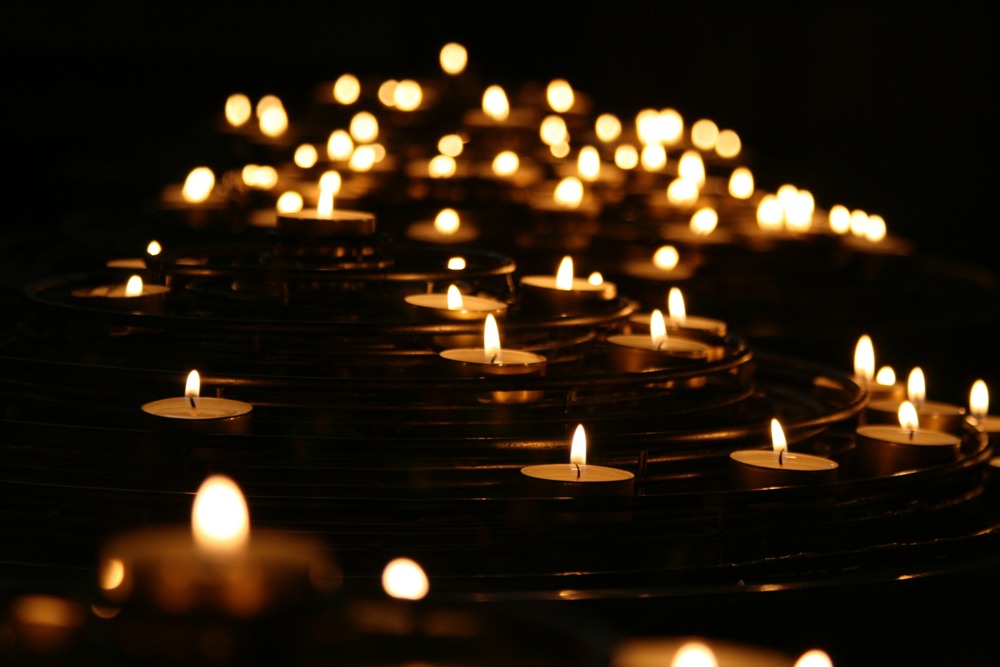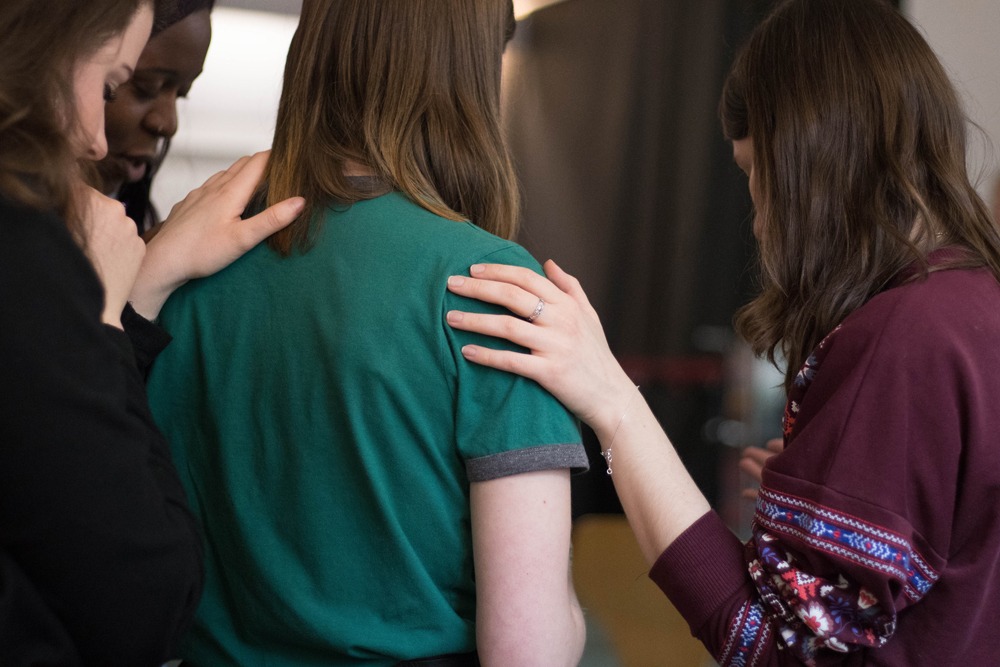How to survive grief?
What to do when, after experiencing a severe loss, you find yourself in a black hole of sadness and despair that mercilessly pulls you under? How to go through mourning so that in the end you can really come to terms with what happened? See how changing your perception of mourning can help you accept what seems unacceptable.

At the very beginning of our 3-day workshop, Monika (name has been changed to protect her privacy) announced that she lost her husband four years ago. His death was a shock for her. On a day like any other, her loved one found out that he had cancer and that he had only six months left. What’s six months to say goodbye to someone you love so much?
When sharing it, Monika was calm. She pointed out that she had already coped with her grief and moved on with her life soon after her husband's death. She came to do the workshop to explore completely different areas of her inner world.
In the next phases of our group work, Monika tried to hold on to the aim she had chosen and instruction she had imposed on herself. However, something inside her still drew her attention to the events of the past. The emotions, which she believed had already flown away a long ago time, started to surface.
Frequently leading my workshops I encourage participants to allow themselves to welcome all emotions that come to them. Asking this rational part of our personality to step aside during this process allows us to let our psyche lead in seeking out what it needs most. Our subconscious knows perfectly well what we should focus on at that particular moment of self-work process.
During the next exercises, Monika uttered/revealed again (showing surprise) that the emotions associated with her husband’s death kept coming to her. She seemed a bit frustrated about it. It probably wasn't the issue she wanted to look into any more.

A few days earlier, I read about the psychological aspects of experiencing the grieving process, and when I listened to Monika's record of one of the exercises, a thought from this article came back to me. Its author wrote about the fact that sometimes because of fear of being overwhelmed by emotions associated with loss, we escape from mourning and “freeze” it in our body. We cut ourselves off from these feelings, keeping ourselves from experiencing profound sadness after losing our loved one.
The problem is that this sadness doesn't go away. We shut it in the deepest recesses of our psyche, below your conscious awareness, from where it constantly affects our daily lives. Like water boiling in a covered pot, sooner or later, it will start to sputter. Repressed emotions, frozen in the body, can cause various diseases, depression or addiction.
I decided to find out how Monika is dealing with her grief. I pinpointed to her that the emotions associated with the loss of her husband keep coming back to her, in a natural and spontaneous way. I asked if she would like to take a moment to talk about it and see why this is happening. She willingly agreed to my suggestion. So, I asked her to tell me all about the time of her mourning. How did her grieving process look like? How long did it last? How did she deal with it?
Monika replied without hesitation: "My mourning lasted a very short time. When my husband was fading, he asked me for one last thing. I promised him that I would fulfill his request, no matter what. So he asked me not to cry over him, or fall into despair and make my life miserable because of his death. He wanted me to move on with my life as soon as possible and not waste it with grieving. And that's exactly what happened. As soon as he passed away, I suppressed these emotions and very soon moved on with my life."
It became obvious to me that Monika couldn’t deal with her mourning at all. She hasn't experienced it yet. As a result of the promise she had made to her husband, she froze these feelings in her body so that she could quickly return to leading a normal life.
What is grief?
Some time ago, I came across a quote that particularly caught my eye:
"Grief is the price we pay for love."
I was taken aback by it when I read it. It's so simple and evident. The more we get attached, the more grief we experience. Trying to find the author of these words, I came across British psychiatrist, Dr. Colin Murray Parkes, who is an expert on mourning. In one of his books, he stated: “The pain of grief is just as much part of life as the joy of love: it is perhaps the price we pay for love, the cost of commitment.”
What is distinct about mourning is that there is no simple cure for it. You have to go through grief. Face it. Profound sadness after a loss is a completely natural and adequate response to a difficult situation and escaping from this pain only delays the real healing.
And that’s particularly because mourning is not only about sadness. It can also trigger anger, denial, guilt and despair. Everyone goes through mourning in their own unique way and most often it encompasses a mix of different feelings, which make mourning even more difficult to cope with. That’s why, the biggest challenge in coping with a loss is to allow yourself to experience that whole flood of emotions.
Note that the loss of your wife, or husband, or your parents, is not the only cause of grieving. Mourning is a part of life, and sooner or later, we all experience it. A crucial aspect of our nature is the need of commitment. We get emotionally attached to people, animals, places and objects. Therefore, mourning can be associated with various losses that we experience in our life, such as:
- Divorce or relationship breakup,
- Losing a job or retiring,
- Miscarriage,
- Death of a pet
- Loss of a cherished dream,
- Selling the family home,
- Losing a family engagement ring passed down from generation to generation,
- Loss of a long-time friendship.
All these events are associated with the loss of something you love. This loss begins the grieving process - experiencing profound sadness, sucking you in like a big, black hole.

Neuropsychology of grief avoidance
To learn more about situations like the one that Monika was going through, I reached out for the latest research related to how to cope with a loss. Last year, psychologists gathered what processes in our brain are responsible for the phenomenon of "delayed grieving." It was obvious to researchers that avoidant grievers attempt to control their external environment in order to avoid reminders of their loss (e.g. by putting aside all photos of the person who passed away). However, none of them have been able to show whether such people are able to control their inner world as well.
A study run by Columbia Engineering and Columbia University Irving Medical Center (its results were published on December 7, 2018) sheds new light on the phenomenon of “delayed grieving”. The lead author of the study, Noam Schneck, wrapped up the conclusions as follows:
"Our findings show that avoidant grief involves attentional control to reduce the likelihood that loss-related representations reach full conscious awareness. Even though they are not aware of it, avoidant grievers actively control their mental state so that spontaneous thoughts of loss do not enter their consciousness.
This kind of tailoring of mind-wandering likely exhausts mental energy and leads to time periods when the thoughts actually do break through. It is like an ineffective pop-up blocker that runs in the background of your computer. You might not be aware that it's there but it slows down the overall operating speed and eventually breaks down and the pop ups get through."
The psychologists working at this study suggest that one of the ways to deal with grief can be actions (e.g. meditation or relaxation exercises) aimed at letting go of conscious and subconscious control, which we use to avoid any loss-related thoughts.

Sometimes, however, we are not ready to look into the eyes of this despair that lurks in the recesses of our psyche. Then, delaying grief is our defense mechanism, which allows us to go on with our daily life.
Distress can be so overwhelming that unless we receive substantial support and space to let this feeling in, it can become a traumatic experience for us. That is why, when grieving it is crucial to reach out to people who are willing to help you. By sitting next to you when you cry endlessly. By hugging you and not telling things like "It’s time to move on" or "Nothing like that happened". You have every right to feel the way you feel when you experience loss. If your suffering seems to be too much for you, before you open the door to the place inside you where you have hidden your grief, make sure that there is someone you can turn to in the most difficult moments.
When you allow yourself to grieve
What can the passing away of a loved one look like when we allow ourselves all the feelings that accompany it? To answer this question, I will quote an email from Ania.
I met Ania at the workshop I conducted on working with parts of our personality. When talking about how some of them protect us from a deeply buried pain, I told the story of Monika from the beginning of this article, how she avoided her grief, thinking that she was already over it. I also mentioned how important it is to allow oneself to experience all these feelings associated with the loss of a loved one, so that all this suffering is not frozen in our body for years.
Ania didn’t know at that time that the idea of allowing herself to grieve would become her reality merely three months later. Here is the message I received from Ania less than two weeks ago (Ania agreed to publish this text). Brace yourself, take a deep breath and go on reading:
"Two days before Christmas, my father-in-law, who suffered from a heart disease, suddenly had a stroke. When we (my husband and I) ran into the room, we found him unconscious lying on the floor. We checked and there was no pulse.
My husband began a heart massage. I tried to call an ambulance. My hands were shaking, at the same time I kept checking whether he was breathing. Something like “now we are fighting - come one - breathe, breathe, breathe” came to my mind. When I consciously focused on my breathing, I finally managed to call an ambulance. The lady from the dispatcher (I am very grateful to her) spoke calmly and straight to the point. We did what she told us. Her composure, calmness and factual information helped me focus on what I was doing.
I relayed to my husband everything the woman was saying. When my father-in-law regained his pulse, we turned him over to the side, and whenever he lost it, we resumed heart massage. The father-in-law alternately lost his breath and pulse, then regained it for a moment. Then it struck me: he is dying on our hands and there is nothing we can do about it ... And again this feeling of overwhelming helplessness. I had no control over this situation and the only thing I could do was to feel it, that is helplessness and lack of control. It hurts like hell... in such a situation.
Then a "tornado” went through our house. The fire brigade (the nearest rescue unit) arrived, then an ambulance, followed by another ambulance. Suddenly, the house was full of people. My mother-in-law was in shock. We moved aside, paramedics took over. The rescue operation lasted several dozen minutes. I alternately held my mother-in-law's hand and ran to my children who were in another room. I looked at all the hustle and bustle. I looked at my husband who stood over his father... I knew that he was dying and there was nothing we could do about it.
Now it goes in my mind like a slow motion movie. The moment when my father-in-law died, I was with my children. I told them what had happened and asked them not to hold their sadness inside themselves, but to let it out... I myself was not able to cry. I think the level of adrenaline was still too high.
The release came the next day. There were some magical moments later on. For example, a scene where Grandpa is lying on the sofa, and in this silence after all the turmoil we are saying goodbye to him. Then I thought that we can experience such moments only very rarely in life now. Most often, people pass away in a hospital or a hospice. Thus, we have no opportunity to get familiar with death and recognize it as an integral part of life, and yet it is the only certain thing in our life. The only one...
This sad event and what followed allowed me to get in touch with my pain, sadness, longing, powerlessness and fear. We experience it without escaping, hiding, suppressing. We simply went through grief, and we actually still do. Our life consists of various moments of joy, happiness, but also suffering and sadness, fear and longing - these are inseparable elements of us all. It's good to just allow yourself to experience it, feel a sense of joy, but also other things, including those that cause us pain. "
When I read this email for the first time, it felt as if the world stopped. With each word I read, I experienced growing tension inside me and felt like I was there with Ania... When reaching the end of her letter, all this tension gave way to the admiration of saying goodbye to someone you love in such a beautiful way. I am very impressed with Ania's maturity and courage to accept all these difficult emotions. I would also like to take this opportunity here to thank her for giving consent to publishing her letter. I’m sure it will help people who have to face loss in their lives.
Although, without doubt, all these emotions associated with loss are extremely difficult and can be very overwhelming, it is often the very fear of them that makes things look twice as bad as they are. We have the impression that when we open ourselves to grieving, it will consume us and we will never get out of it. We fear that despair will devour us and that we will never see the light again. The truth, however, is that the worst thing about grieving is the fear we have of allowing it. Grief, if we give ourselves full consent to feel it, is very difficult, but it is something we can go through and truly accept loss.
For some, the story of Ania, quoted above, is enough to take on this challenge and when the time comes, face the grief and try to cope with it. For others, however, this is not enough, and then what can help is understanding the mechanisms behind the grieving process. So, let's see what happens in our head when we experience loss.

How does our psyche deal with grief?
We will now look at the process of experiencing grief from the point of view of Internal Family Systems therapy, which assumes that our personality consists of parts (the so-called subpersonalities, such as an internal critic or an internal child). On how different parts of our personality respond to loss, I had the pleasure to read in the book "Innovations and Elaborations in Internal Family Systems Therapy" in a chapter by Derek Scott, an IFS therapist. Below is a summary of his work.
- A group of parts responsible for the first response
When we lose something or someone that was an important part of our lives, our first response is being shocked. We tend to reject and deny what happened. The parts responsible for that are protective parts, which want to shield us from the pain that is already present in our subconsciousness at this stage. Denial in some way prevents those most suffering parts from being activated, as their pain and despair could be too overwhelming at this point.
Note how often people who have lost a loved one say something like “I still can’t believe it". This is because there are parts that want to keep us in denial. They protect us from being flooded with difficult emotions, until they are certain that we are ready to endure the pain they bring without being overwhelmed. After a few moments, days or even weeks, these parts will slowly begin to give way to the difficult emotions, stuck in the basement of our subconscious.
- A group of grieving parts
When the above described parts are ready to make room for grief, the “grieving” subpersonalities (the so-called "grief cluster") surface. Dwelling in profound sadness, they deny, yearn, regret or feel guilty. They carry all the pain associated with the loss of what we love and need and lead us on the inevitable path of mourning.
These parts, initially withheld so that their load can be assimilated gradually, aim at internal integration of the weight of loss.
- Group of parts responsible for moving on
At some stage, we are ready to start thinking about picking up the pieces and getting back on track. We begin to focus on the things that we have long forgotten about or put aside. We start to think about the future and find the willingness to move on with life.
Of course, it is never the case that we are done with grief just like that and become willing to leave it behind straightaway. People often stay in between the need for grieving and the desire to move forward. In other words, in our inner family there are, on the one hand, parts experiencing grief, and on the other, parts responsible for returning to normal life. This mechanism gives us times of relief during the process, which can often take long and be very painful.
When the parts responsible for integration of the weight of loss have had enough time to process what had happened, the group of parts responsible for moving on activates and begins. However, this doesn’t mean that the mourning is over. Once in a while, we can still experience "mourning outbursts" - intense waves of pain coming and going weeks or months after the loss.
Complicated or incomplete grief
The above description applies to grieving that comes and goes naturally. Unfortunately, sometimes we don't allow ourselves to experience difficult emotions (like in the story from the beginning of this article). It happens when the parts, in concern about our well-being, overprotect us from sadness and prevent us from experiencing grief till long after the painful events took place. Here are the most common strategies these parts use to avoid mourning:
- Minimizing the meaning of the loss. "We weren't so close to each other" or "Nobody mourns a cat like that!"
- Somatising, that is converting feelings into physical symptoms, e.g. migraines.
- Replacing, which means avoiding grief by forming a new attachment, e.g. entering into another relationship, right after you lose your partner, or buying a new dog as soon as your previous one passes away.
- Putting off grief.
Complex grief usually occurs when the loss is sudden and unexpected (e.g. suicide, homicide, tragic accident). However, there could be plenty of reasons why we wouldn’t allow ourselves to feel sadness. Sometimes it is related to social expectations or the influence of our close ones ("It's been a long time, you should have already got over it!").
When, for whatever reason, you criticize yourself for experiencing sadness, you will not let yourself to complete the mourning. Instead, you will put it on the backburner and freeze in your body, sometimes for years.

Now pause and seek similar experiences in your life. If you have ever gone through mourning before, how did it go? Do you feel now that you have really let it flow? Or did you try to run away from it, pushing these feelings underground? If you have been hiding these feelings, do you think you still have access to them?
If you avoid grief, it is worth getting support from a psychologist or psychotherapist. By working on the internal mechanisms of escaping pain, you will be capable of walking onto the path of grief. It's a process that can't be faced any other way than head-on. That's why the sooner you let it, the sooner you'll get out of it.
If you have experienced loss not so long ago, ask yourself - "Do I let myself feel this sadness?". Ask yourself whether you avoid your grief. This is important, because if you do, it will probably have a big impact on you over the next few months or even years. Also, if you do, you prevent yourself from full healing.
In a sense, I had the chance to go through grief, which can be called complicated, although it was not my grieving. 4 months after my conception, when I was growing in my mother's body, my grandfather, that is my mother's father, passed away. My mother was very attached to him and his death was something unimaginably difficult for her. Worried about how her despair might affect her child (that is me), she tried in various ways to push down her grief ... suppressing the sadness that could overflow her body. Of course, such a response might have affected both her grieving process and the baby’s development. Now, more than 30 years later, my mother is reconciled with her loss, and I am still exploring the influence that experience might have on me.
I also remember profound sadness that overwhelmed me after my beloved dog died. He was hit by a car and was fading in our living room. We were all right beside him, when he breathed his last breath. The feeling of emptiness after this loss was unbearable, but I let myself go through the grieving process.
5 stages of grief
A deeper understanding of the grieving process can help us deal with what we experience after a severe loss. That's why I decided to present here one more model that sheds a slightly different light on grief than the ones I mentioned earlier. These are five stages of grief according to psychiatrist Elisabeth Kübler-Ross. She described them in the book she wrote in 1969 entitled “On Death and Dying”. You will probably find it in some ways similar to the mechanisms described above, but I’m sure you will also learn something new from it on how to survive grief.
- Negation
- Anger
- Bargaining
- Depression
- Acceptance
Let's take a closer look at each of these stages.

- Denial
The first response to the loss of a loved one (or something significant to us) is usually denial. "This can't be happening," "It can't be true." We are in such a shock that we are not able to grasp the information about the loss at this stage.
The more difficult it is for us to accept the news about the death of a loved one, the more strongly we deny the situation. This brings back the memories of my grandmother, who after my grandfather's death (of cancer) for several days did not acknowledge the fact of him passing away. She was convinced that he was still alive and kept asking when he would return home from hospital.
- Anger
At this stage, we feel angry and we are looking for a scapegoat to blame, we wonder why this happened to us. Our anger seems abysmal, but it's important to let yourself experience these feelings completely and not block them in any way. Anger is a powerful emotion and can be an anchor for us, preventing us from feeling great emptiness. Sooner or later, this state will pass, making room for the next stage of grief.
- Bargaining
At some point, we want to regain control in the face of our helplessness. So, we begin to "bargain" - our mind make questions like "If only I had called the doctor earlier ..."; "If only I had been kinder to him ..." In a sense, we are looking for a way to get back on track and we turn to a higher power for help. This may be accompanied by a sense of guilt as we start to think that there might have been something on our part that contributed to this loss.
- Depression
Once we get through the stage of wandering thoughts to alternative scenarios of our past, our attention starts to focus on the present. We are ready to face our pain. Profound sadness can be fully expressed now, we feel it stronger than ever before. At this point, we also have the impression that this state will last forever. It is important, however, not to see this stage as a symptom of mental illness. Depressive states are a completely adequate response to a significant loss. If we let ourselves fully experience this state, sooner or later, it will pass. This is an integral part of the healing process.
- Acceptance
When the sadness subsides, we are ready to accept what happened. This does not mean that we feel good about it. It just means that we stop fighting reality. We learn to accept it and live with it.
Everyone will experience grief in their own unique way and this process will not always look as described above.
Sometimes the order of stages will be different, and sometimes a stage can be skipped. Everyone is different and there is no "right" way to survive grief. The time we spent in each stage depends on many factors and we can’t predict when the process will end. It's important to give yourself space to feel all your emotions without judging them.
Also, don’t be afraid to accept the support of your relatives or friends. What you need is someone who will be with you, spend time together, lend an ear to listen and a shoulder to cry on. Avoid, however, people who minimize or deny what you are going through emotionally ("Come on, it’s not a tragedy"; "Stop despairing, it's time to move on").
In the grieving process, remember to accept constant ebbs and flows. It is completely natural that you will shift between difficult feelings of sadness, anger, longing and despair, and a desire and willingness to move forward, plan the future, set new goals. Over time, there will be more and more positive emotions arising.
If you feel ready, share your experiences with grief in the comments section. Just like the stories of Monika and Ania quoted in this article, I am sure that your story can also give hope and strength to people who are just going through grief (or who are about to face it).
If you know someone who has recently suffered a loss, please send them a link to this article. It might become a road map for this person, who probably feels alienated in this world (or it may seem hostile and sad to them now), on how to survive grief.
And if you ever have the opportunity to be with someone who is in mourning, help them feel what they are so afraid to feel. Support them and accept all their emotions. In this way, you will contribute to the healing process, which, no matter how painful, leads us to acceptance and reconciliation with the fact that everything in our life is subject to change.
